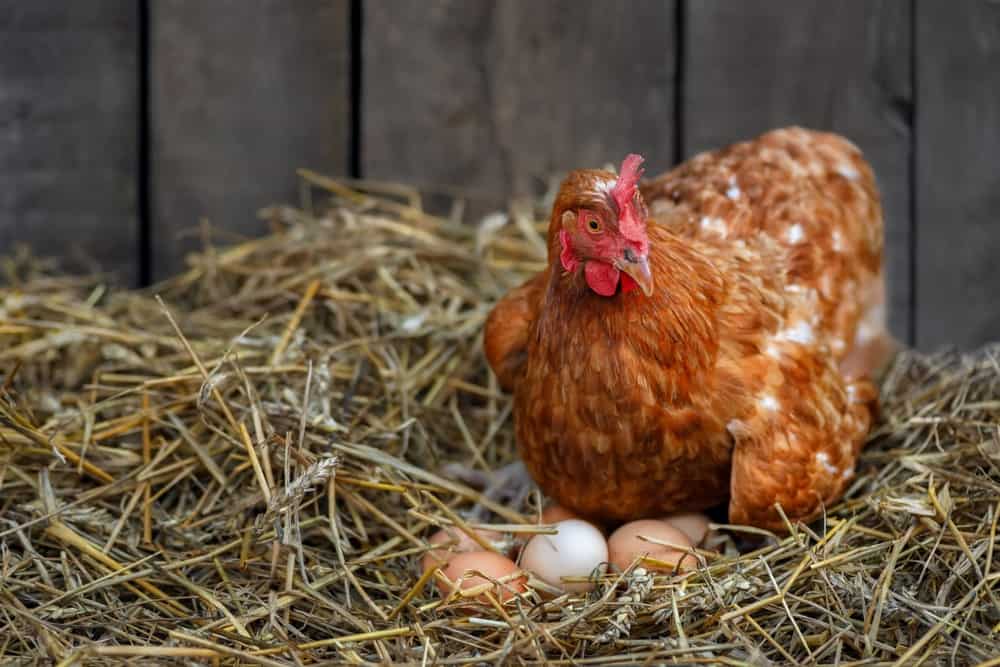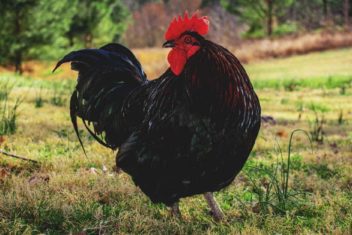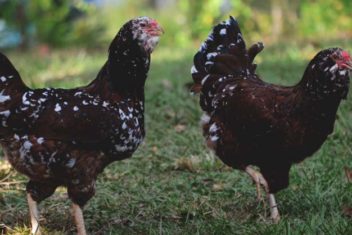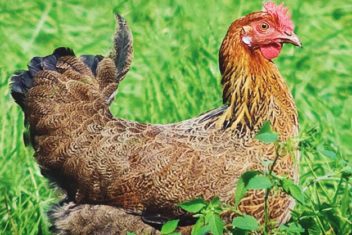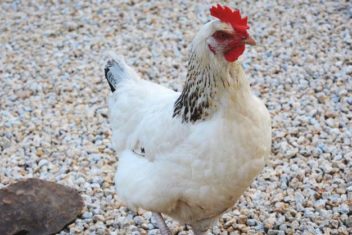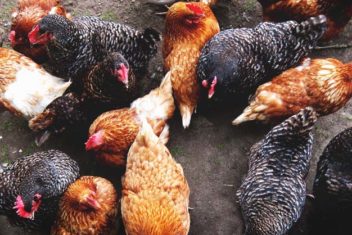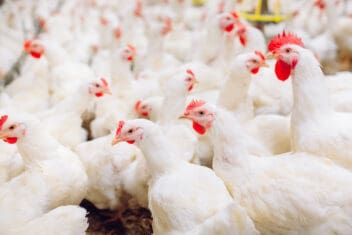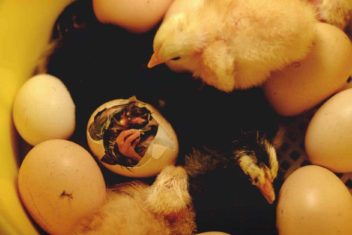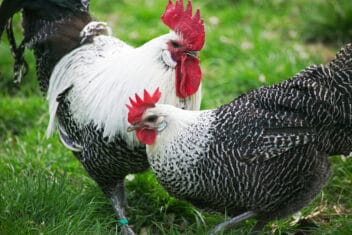Chicken health is so important in the home flock. Your layers are certainly not a feed-and-forget animal. You have to keep an eye on them at all times. Learn their behaviors and personalities, and investigate any bird you think doesn’t look healthy.
Egg binding is a life-threatening situation that can cause severe pain and discomfort in your layer, so it’s essential to recognize the signs and know what to do before it is too late.
If you have chickens and want to know about an egg-bound bird, let’s get going on this critical subject.
What is Egg Binding?
Before discussing the cause of egg binding, let’s look at some anatomy. The yolk leaves the ovary and drops into the infundibulum below. It stays there for about 15 minutes before moving into the magnum below. It stays here for several hours while the white is deposited.
The white and yolk then move down to the isthmus, where it stays for a few more hours, and the membrane forms. Finally, it moves to the uterus and develops a hard outer shell over the next day or so. Once the shell is formed, it exits out of the vagina through the vent.
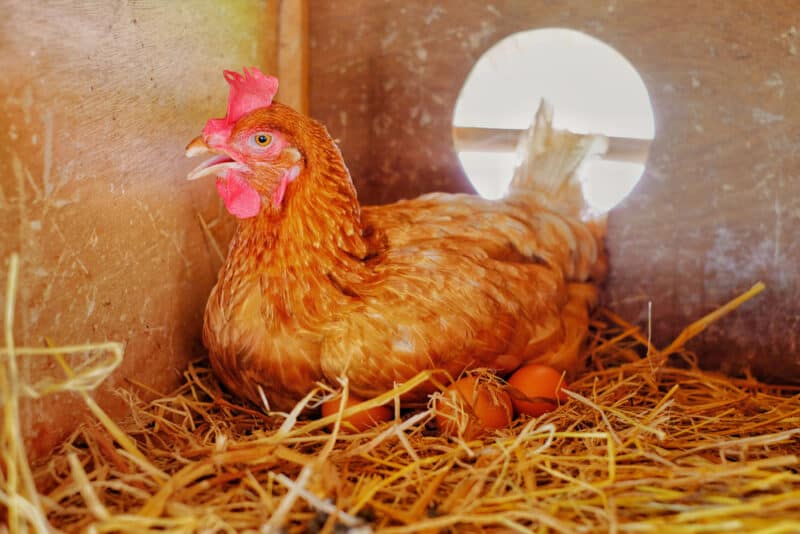
At its most basic, egg binding (Dystocia) is when a chicken has an egg stuck inside her that she can’t expel or lay. Often (but not always), the egg is large and gets stuck above the vagina. This stops the remainder of the process of egg-laying.
Normally an egg will move through the reproductive system pointy end first. The egg maintains this orientation all the way to the shell gland or uterus.
When the shell is laid over the internal parts of the egg, it should turn so the blunt or wider end of the egg comes out first. Often, this doesn’t happen and the trouble can begin.
The egg gets stuck in the last section of the tract responsible for expelling the egg, and as hard as she tries, she can’t lay it.
What Causes Egg Binding in Chickens?
There are quite a few reasons why a chicken may become egg-bound, so let’s look at the most common causes:
Worms
A chicken with a high parasite count can become susceptible to being egg-bound.
It’s important to keep your worming schedule current if your vet recommends it. There are many products to control worms in chickens, so make sure you choose your preferred option and stick to it.
Stress

Stress causes a few issues for egg-laying chickens, including blood in the egg. Unfortunately, it can also cause the chicken to become egg-bound.
Whether it is predators, other chickens bullying them, or not enough access to food, any kind of stress might result in egg binding.
Misshaped Eggs
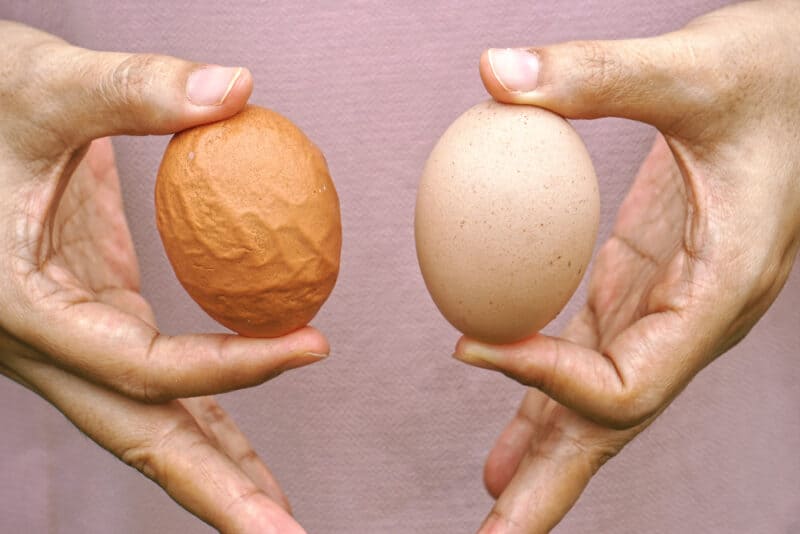
Ever wondered how those large eggs you find in the nesting box make their way out of the chicken? Well, sometimes they don’t. It is often the very large or misshapen ones that become egg-bound.
Lack of Calcium
Chickens use calcium to form the egg, build strong bones, and keep the muscles that push the eggs out healthy. A lack of calcium affects the whole egg-forming and laying process.
Obesity
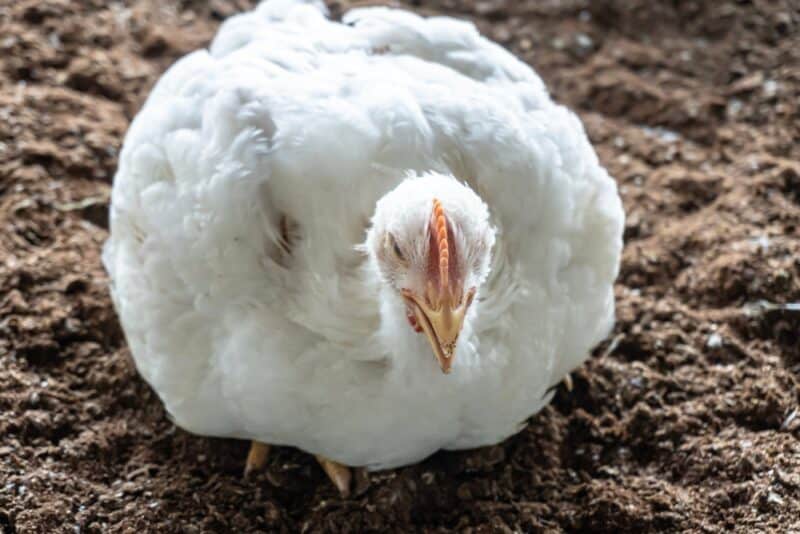
Yes, this is a problem in chickens. You can easily over-feed a chicken, especially if you don’t measure out the correct amount of food for the number of chickens you have or if you give them too many treats.
An obese chicken is a weak chicken, and the muscles won’t be able to push the egg through the tract.
Holding Onto an Egg
Sometimes, when the nesting boxes are occupied by other chickens, a bird will hold on to her egg until she gets her chance to lay. It may be that she forgets, or if she’s bullied, she may not return to the nesting box. This is when an egg can get stuck.
Infection
If a chicken has an infection within the reproductive tract, you won’t know unless she exhibits signs. Often, the result of that infection is egg binding (and other issues as well)
Premature Laying
Sometimes, large operations use artificial means to force egg-laying early. This is not done on homestead chickens, but if you get chickens around the 20-week age from a supplier, you may want to confirm they haven’t done this.
You can also induce premature laying if you use artificial lighting in your coop and you have pullets.
Symptoms of an Egg-Bound Chicken
These are some of the signs you should look out for. If you are unsure, seek the advice of a vet.
It’s not as easy as it sounds to identify the symptoms. Chickens have a pecking order (or hierarchy), so in order to avoid being attacked or killed because the others notice she is sick, she will hide her symptoms as best as she can.
Unable to Pass Stools
If you think about an egg blocking the vent, it will likely prevent anything from passing out from the intestinal tract. Sometimes you will see tiny amounts of poop being expelled, or the poop is wet and foul smelling.
Lethargy and Frequent Sitting
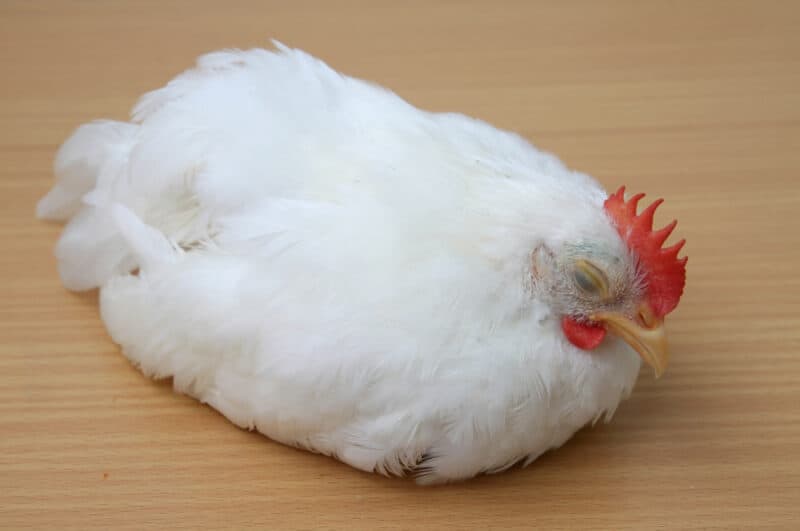
The chicken will look depressed and be devoid of any energy. She will only walk short distances before having to sit down again. She will often close her eyes for extended periods as though she wants to sleep.
Penguin Walk
This is sign number one in many cases. The chicken walks a bit like a penguin and seems very uncomfortable while appearing distressed.
Tail Pumping
This is a common sign as well. The chicken will stand with a wide stance and squat down in an attempt to ease the egg out.
She will pump her tail up and down repeatedly to try and convince that stuck egg to get out. This is sometimes successful, and she will walk away quite satisfied with herself. Other times, it’s futile and exhausting.
Shaking
Being egg-bound for hours takes its toll physically on the chicken. This can result in shaking from exhaustion.
Reduced Food and Water Intake
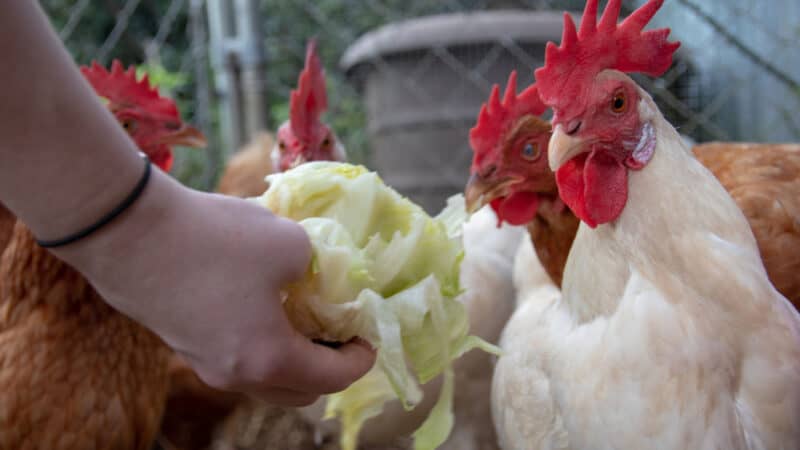
This can be a sign of many things but do pay attention. Egg-bound chickens will reduce their food and water, but dehydration, in particular, can make the situation much worse, much like in humans who suffer from constipation.
What to do About a Chicken That is Egg Bound
If you notice this early on in the process, there is a very good chance you can remedy the situation reasonably quickly and sort it out yourself, but you need to be very gentle. It’s best to do this with the help of someone else, though it is achievable on your own.
- Put on a latex glove and put Vaseline on a finger.
- Gently pick up the chicken (or get an assistant to help) and hold it at waist height, facing backward with the vent facing you.
- Gently insert the lubricated finger into the vent. You won’t need to insert it any further than two inches. If within two inches you don’t feel an egg, there is probably not one stuck.
- If there is an egg, put half a cup of Epsom salts in half a gallon of lukewarm water.
- Gently sit her in the water with her vent and abdomen submerged. You will need to carefully hold her still like this for 20 minutes. Usually, the warm water is soothing, and she will settle down quickly.
- Remove her and gently dry her off with a soft towel.
- Isolate her and place her in a warm area with low light and plenty of hay or straw to sit on. Consider lubricating the vent a little bit with Vaseline on a gloved finger, but this isn’t always necessary.
- Check on her every half to one hour. If she hasn’t passed the egg in two to three hours, repeat the bath again.
- If you do this three to four times and she is still egg-bound, it’s time to contact your vet.
How to Prevent Egg Binding in Chickens
Preventing egg-binding is mostly about keeping your chickens healthy. A healthy bird is better able to lay regularly without trouble.
Control Their Diet
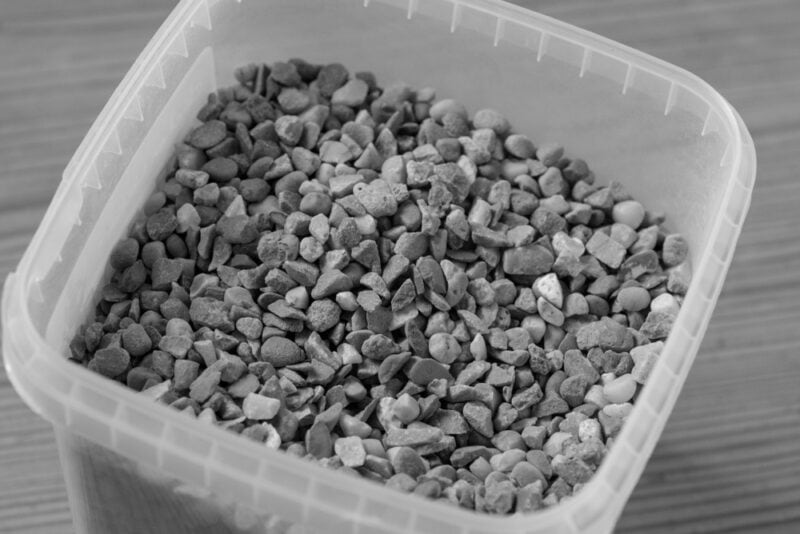
Provide a good quality feed that has a good balance of essential nutrients for egg layers. Provide oyster shell for additional calcium, and make sure their water is always clean and fresh.
Treat for Worms
Chickens don’t need to be treated for worms unless they are experiencing a problem. But if your chickens are struggling with some kind of parasite, you need to address it.
There are various treatments out there and it’s worth chatting with your vet for information on which your chickens need and how to use the product.
You can also use products to keep worms out of the coop and nests. Look for nesting herbs like those made by Pampered Chicken Mama.
Control Stress
Chickens are sensitive to change with things like a new home, coop, or run. This can also include new chickens to the flock. Make changes incrementally and isolate any sick chickens straight away.
Provide Enough Nesting Boxes
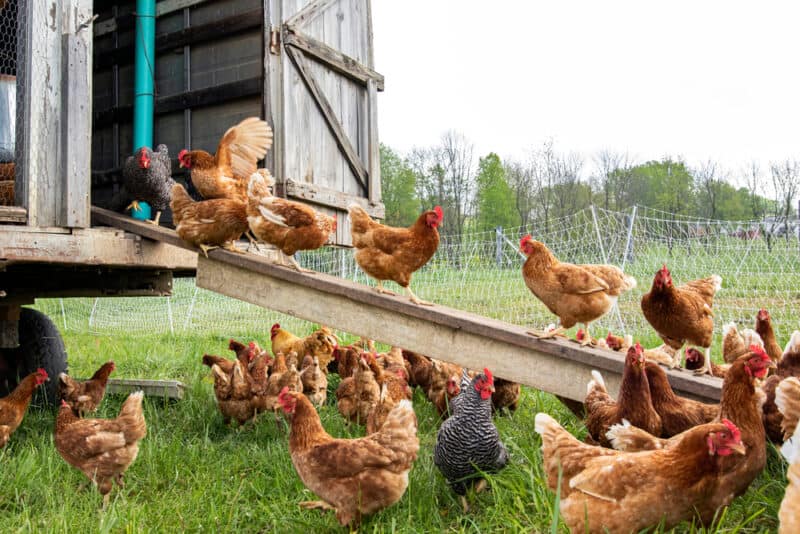
If there are too many chickens for the number of nesting boxes you have, they tend to hold on, especially if they are weaker, smaller or lower in the pecking order. If there are enough boxes for the amount of chickens you have, they won’t need to hold onto their eggs.
Monitor Your Chickens
You won’t know there’s a problem if you don’t keep an eye on your birds, especially those that lay big eggs. So monitor your chickens carefully for early signs of being egg-bound and pay attention to who is laying and how often.
It’s difficult to tell who lays which egg in large flocks, but in smaller flocks, you usually know.
Keep the Chickens Healthy
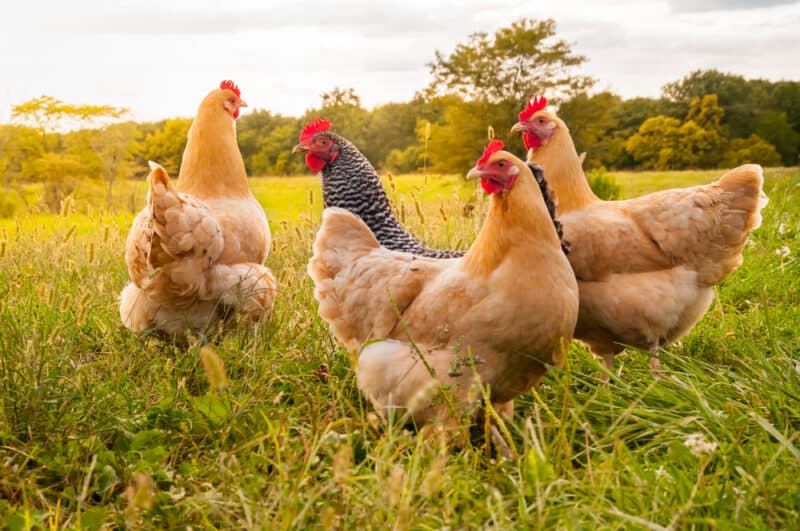
Although you can’t control infections, you can go a long way to preventing them in the first place. Clean water, coop, and run are paramount. Worm when required and provide sunshine, shade sand, or similar for them to have a dust bath.
Some chickens are predisposed to suffering from egg binding, so keep an eye on your flock. Seek professional advice if you find you have a chicken that suffers from this often.
